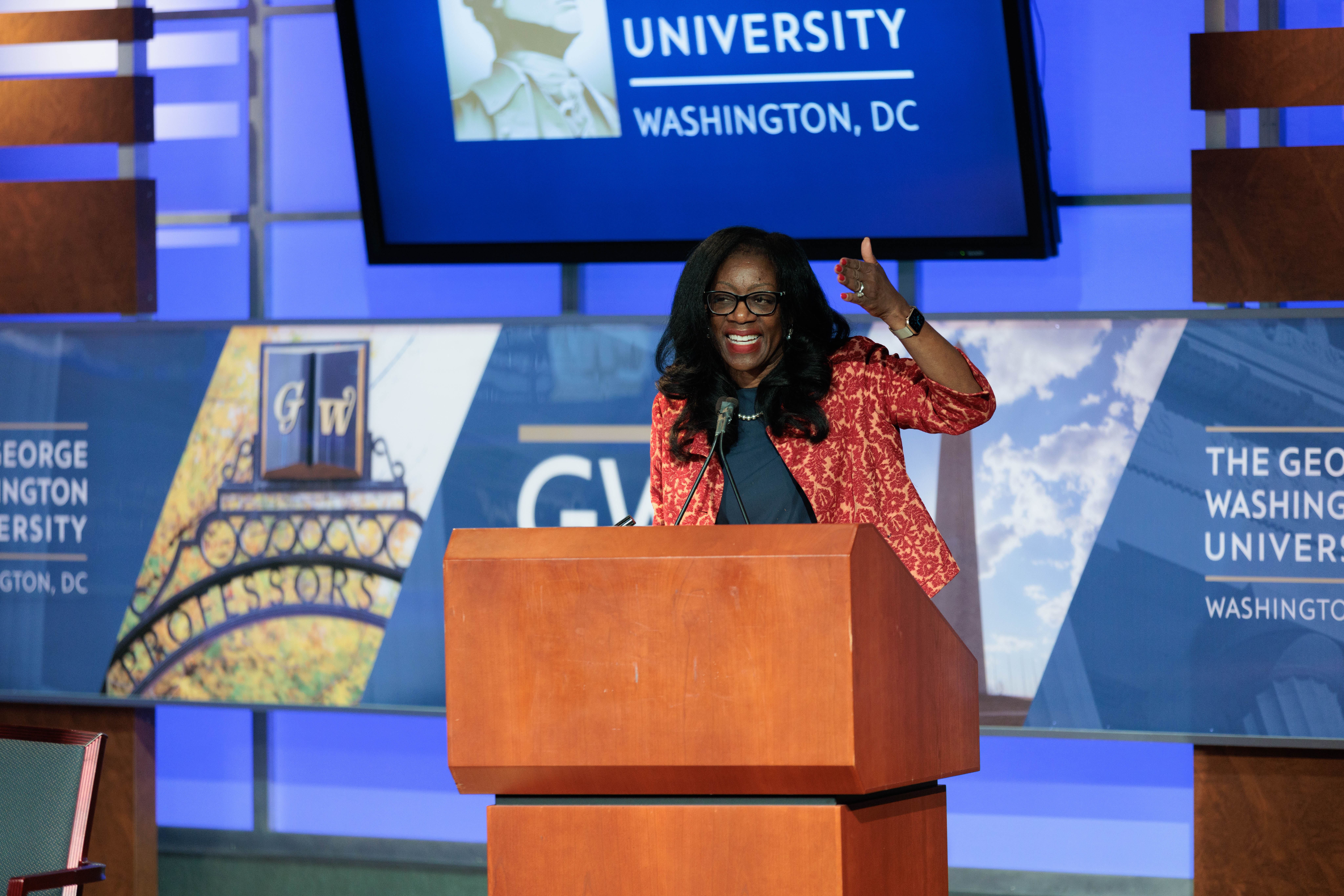“Today our nation awakens having moved one giant step closer to a more perfect Union in which equal justice is available for all. Congratulations, Justice Ketanji Brown Jackson. Congratulations, America,” GW Law’s Dean Dayna Bowen Matthew tweeted on April 8, 2022, in celebration of Judge Ketanji Brown Jackson’s confirmation as the 116th Associate Justice of the United States Supreme Court.
Justice Jackson made history when she was confirmed on April 7, 2022, to serve as the first African American woman appointed to the high court. Although the Supreme Court was established in 1789, for the first 192 years of its history, only white men sat as justices on the highest court in the land. Then, in 1981, Sandra Day O’Connor became the first woman to sit on the Court when she was confirmed by a vote of 99 to 0. Now, 233 years after the Supreme Court was founded, Justice Ketanji Brown Jackson will be the first female African American Supreme Court Justice.
Through an open letter to the members of the U.S. Senate and media interviews, Dean Matthew helped to drive the conversation of support for Justice Jackson in the weeks leading up to the confirmation hearing. The letter of support was signed by 100 percent of the Black deans of law schools across the nation, and by deans from Canada, and Puerto Rico. 44 in total.
In its opening paragraph, the letter states:
“We, the Black Deans of U.S. Law schools, write to express our strong and unequivocal support for the Senate’s confirmation of Judge Ketanji Brown Jackson to the Supreme Court of the United States. As leaders in the American legal academy, we believe this confirmation would represent a triumph for this nation. By confirming this honors graduate of Harvard College and Harvard Law School, who has participated in civil cases at the highest levels and has also represented indigent criminal defendants, the Senate will not only add a supremely qualified justice to the Supreme Court, but will also ensure that people from all communities across our nation enjoy the promise emblazoned over the Court architrave that declares ‘Equal Justice Under Law.’”
In an interview with The Root, published on March 28, 2022, Dean Matthew explained the intent of the letter, saying, “I had the pleasure of drafting the letter with other Deans who felt as I do and, as it turns out, 100 percent of the Black Deans in the nation do [believe] that this is a historic appointment. We wanted to speak with one very powerful voice about the brilliant qualifications that we are uniquely situated to assess and that are possessed by Ketanji Brown Jackson.”
“All of us have studied law, practiced law, taught law and lead the nation’s schools in training lawyers,” she continued. “Together we wanted to tell the Senate and Judiciary Committee ... Judge Ketanji Brown Jackson is an outstanding jurist who should be swiftly confirmed to sit on the Court.”
On PBS’ News Hour, aired March 22, 2022, Dean Matthew, was invited as a panelist to provide her analysis of the first day of Senate confirmation hearings, in which she explained she was most impressed by Judge Jackson’s focus on her own personal methodology and her ideology, or rather, lack thereof.
“Whether it’s antitrust, or first amendment, or second amendment or fourth amendment cases; whether it’s the right to vote or whatever constitutional provision she is looking at, it’s always the same,” said Dean Matthew. “You heard [the same] words over and over again: ‘My methodology is that I operate with constraint and restraint; my ideology is that I have none.’”
In an interview with Roll Call, following the Senate’s 53-47 vote in which Justice Jackson’s nomination was confirmed with bipartisan support, Dean Matthew states that the confirmation “means we might finally reverse the discrimination and take another step towards becoming a more perfect union that we said when we first started this country.”
At GW Law, Robert Brauneis, Michael J. McKeon Professor of Intellectual Property Law, and Co-Director of the Intellectual Property Program remarks on the potential impact Jackson could have on the Supreme Court. “Justice Jackson may not initially have a lot of influence in the high-profile, conservative-versus-liberal cases in which she will likely end up in the minority. However, typically more than half of the cases that the Supreme Court hears are decided unanimously or with scattered concurrences or dissents. In each of those cases, there is an opportunity to influence, not which party wins, but how the Opinion for the Court is written, which can significantly change the course of the law,” said Professor Brauneis.
“I expect that Justice Jackson's abundant powers of reasoning and diplomacy will enable her to take advantage of many of those opportunities,” he continued. “I also expect she will be a strong voice even in dissent. I have no doubt that Justice Jackson's accomplishments will lead many to see more clearly what a tragedy it is that the Supreme Court has for over 230 years missed out on what other outstanding Black women could have given it.”
Laura Dickinson, Oswald Symister Colclough Research Professor of Law, predicts Justice Jackson will serve as an inspiration for law students for generations to come. "Beyond simply the historic nature of her nomination, Justice Jackson is likely to become a clear and powerful voice for the idea that the rule of law in America means principled dialogue in the service of our highest constitutional ideals,” said Professor Dickinson. “I think she will be an inspiration to multiple generations of law students, and I am pleased that our students at GW were able to witness this important event in the trajectory of our nation."


